
Research conducted by the University of North Carolina (UNC) School of Medicine, has revealed that the gut microbiome can have a significant impact on the acquisition of Epstein-Barr virus (EBV) and human immunodeficiency virus-1 (HIV) infections as well as on the course of the disease.
Reporting in Nature Biotechnology, scientists created a first-of-its-kind precision animal model without a microbiome and compared it to a conventional mouse model after viral exposure. According to the researchers, rectal HIV acquisition was 200 percent higher in animals colonized with resident microbiome compared to the germ-free model, while an increase in oral acquisition of the virus reached 300 percent.
“These findings open up a whole new door,” said Balfour Sartor, director of the National Gnotobiotic Rodent Resource Center that derived the germ-free mice. “Would it be possible to alter the gut microbiota, by decreasing the bacteria, fungi, and viruses that might increase expansion of the HIV infection? Or conversely, we could help patients build up microbes that would prevent that expansion and can work synergistically with antivirals to clear the HIV.”
Upon cellular comparisons of the colonized and germ-free animals the scientists also discovered that mice with microbiomes had an increased frequency of CCR5+ CD4+ T cells—the main target of HIV infection in the gut. According to the researchers, these findings suggest that increased HIV acquisition could be due to an increased density of target cells for local infection.
After infection with EBV—a DNA herpesvirus able to cause mononucleosis harbored by nearly 95 percent of the adult population—mice with a normal microbiome developed large tumors in several organs including the liver and the spleen. Germ-free mice were virtually tumor-free.
“We had two human pathogens that are different in every possible way. The type of cell that they are infecting, the type of disease that they cause, the type of viruses that they are is completely different. Yet, the microbiome exacerbates the disease that each of those viruses causes,” said Victor Garcia, PhD, director at the International Center for the Advancement of Translational Science at UNC.
As a next step the researchers want to determine the factors deciding whether the microbiome plays a part in the persistence of HIV and EBV infections and find out if the microbiome also affects other human pathogens.
“Will the gut microbiome also influence reactivation of herpes simplex virus, shingles, and other latent viruses that cause tumors? We don’t know, but there’s a pretty good track record that microbes can influence certain bacterial and fungal pathogens. That may be something to explore as well,” Garcia concluded in a press statement.
“At the heart of all this is that we have created a new series of models that will allow investigators to ask questions they could never ask before. We have been able to do something that others thought could not be done.”













